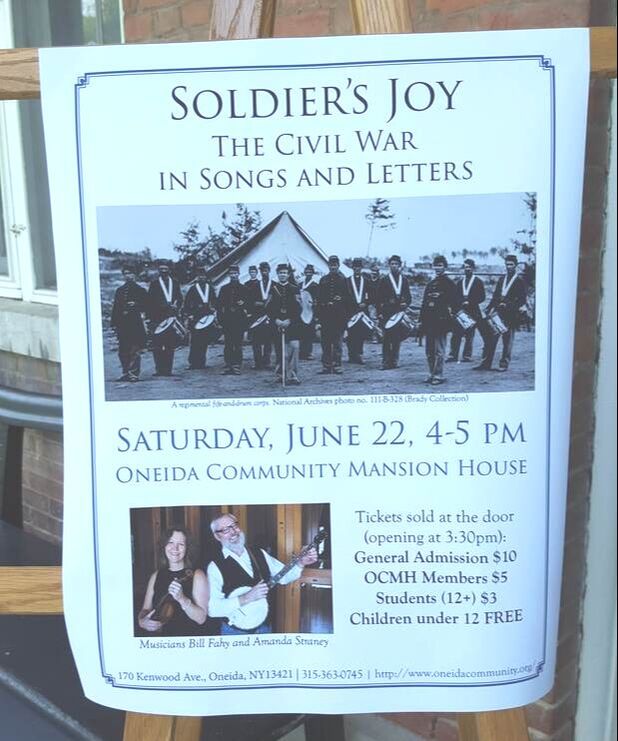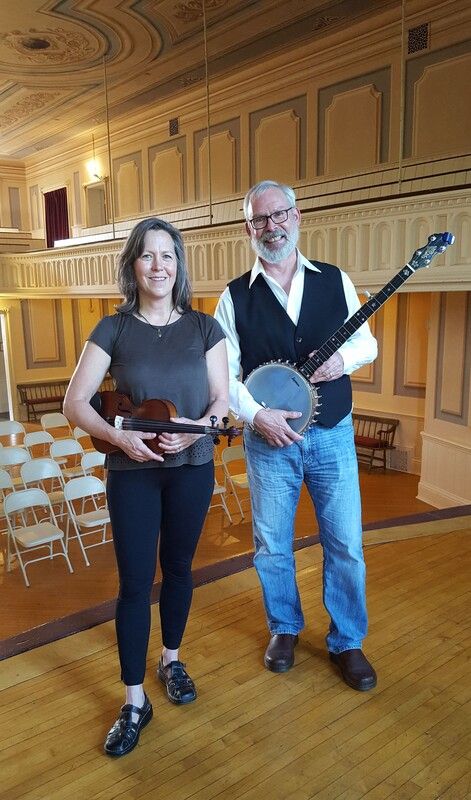|
A fresh summer breeze plays with the heavy red drapes on the open windows behind the stage at the Oneida Community Mansion House. The curtains billow and dance behind the two musicians, Amanda Straney and Bill Fahy. They’re members of Craobh Dugan who have created an original program called Soldier’s Joy. Amanda takes up her fiddle and Bill his banjo. Without any electronic amplification they play their first tune, Year of Jubilo. The notes fill this large room built in 1862 by members of the Oneida Community, a religious commune with an appreciation for music and art. The walls and ceiling are decorated with paintings of swirling scrolls and the acoustics amplify better than microphones and speakers could.
These tunes of the Civil War era were new when this room was new and I feel myself transported back in time 16 decades. Between tunes and songs, Bill and Amanda tell us stories about music during the Civil War, including quotes gleaned from well over 100 hours of research into letters written by the people who lived through that time. We hear their own voices over the many years from the letters they wrote to the editors of newspapers in Rome and Utica, and personal notes they sent to friends, sweethearts, and relatives. Some found humor in their circumstances. In the summer of 1863, one Oneida 4th soldier stationed in Virginia wrote a letter published in the Rome Sentinel that began, “With all the labor, suffering and anxiety we as soldiers have to endure, we often have our fun, and well and right heartily do we enjoy it.” He went on to relate the story of a young sentry, intent on following orders, who shot a farmer’s pig that failed to respond with the right countersign when challenged. Some wrote heart-wrenching pleas. A member of the 117th New York Volunteers wrote a letter to the Utica Observer begging the residents of Oneida County to aid the wives and children left behind by fighting soldiers as they struggled to survive without their breadwinners. “I ask in the name of all that is good, remember our families at home are in need, in distress. The winter is at hand, or soon will be. Do something for them, for I tell you, my dear sir, on the lonely picket post, in darkest night, our thoughts go home; and oh, the agonizing thought comes to him, "oh, God! what will become of my wife and family?" And many mentioned music and its profound effects in their letters. Before recorded music, most people learned how to play an instrument. Of course they took their skills with them when they went to war. There were more than 600 regimental bands in the Union Army, which they used for communication, movement coordination, entertainment and morale. Music was a part of the soldiers’ daily life and led to many significant moments like the night the Union and Confederate armies were camped on either side of the Rappahannock River after the Battle of Fredericksburg, Virginia. One band began to play Home Sweet Home and then other bands on both sides joined in. Soon men on both sides were moved to shout and cheer and one solider wrote that he thought the war may have ended there if the two sides hadn’t been separated by the river. A member of the 97th New York captured the sounds of the battlefield when he wrote, “As I sit writing about 2 miles in front, the pickets are firing & I hear the bang bang constantly. There goes a cannon Boom. So it goes day and night. As it is toward evening brass bands are filling the air with very sweet music. At almost every head Qtrs. sometimes half a dozen are heard at once. A strange commingling of sounds, last night we could hear the singing & playing from camps …a mile away.” We’re familiar with what the Civil War looked like thanks to the work of early photographers like Matthew Brady, but Bill and Amanda were able to bring to life the sounds of this historic period by reading the words of the people who lived it and by playing the music they listened to. It’s a vivid and touching way to connect with history and appreciate what people lived through and how they felt. Bill and Amanda have upcoming performances of Soldier’s Joy at the Woodgate Library on July 10 and at the Earlville Library on July 17, 2019. You can also check out the Soldier's Joy Facebook page to find out about future presentations, which will, in a few months, include their new programs revealing their ongoing research into the Southern and Irish perspectives on the war.
0 Comments
Leave a Reply. |
AuthorThe Craobh Dugan-O'Looney blog is written by Sue Smith Romero. Questions? Corrections? Send them on to her at [email protected] Categories
All
|


 RSS Feed
RSS Feed